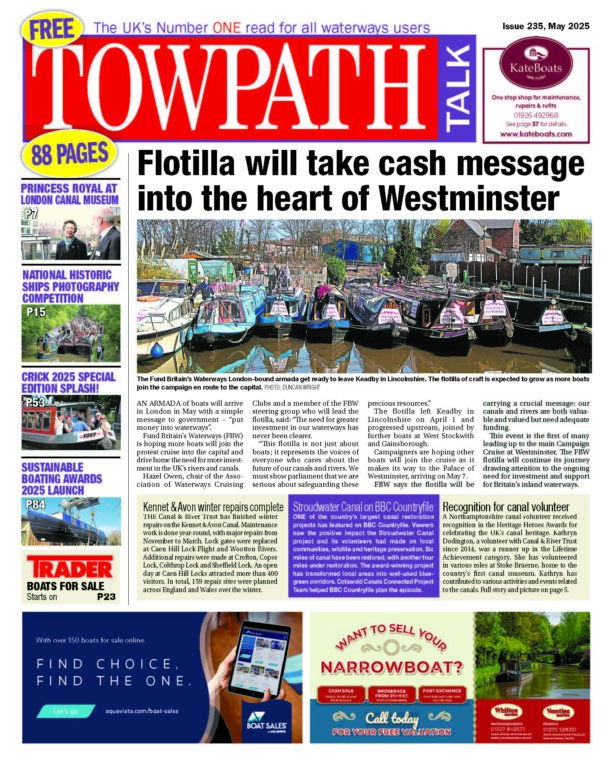THE Canal & River Trust spent £85m in the last financial year on waterway maintenance and repairs, emergency works following floods and storms, and upgrades to reservoirs.
In its annual Boater Report, the charity revealed it spent a total of £208.6m in 2023/24 out of income of £237.3m. That included £49m on maintenance and repair projects, £27m on reservoir upgrades and £9m on emergency works.
With no increase in government funding, CRT has had to increase income from other areas, such as a rise in boat fees taking effect this year and more chargeable moorings in the London area.
An increase in donations and utilities and water development helped boost the income but it stated expenditure had also risen by £7.1m.

Alongside statutory work and planned maintenance, CRT has had to deal with waterway emergencies fuelled by climate change. Storms and flooding have caused damage running into the millions.
The report said: “Our changing climate continued to have a massive impact on our waterways. The succession of named storms wreaked havoc on our network. Thousands of trees were blown down, towpaths were washed away, banks and culverts collapsed, and landslides occurred.”
Following its annual Boater Survey, the charity has pledged to increase boater satisfaction from 46% to 75% by 2030. Issues raised included keeping canals open, ensuring locks and bridges work, improving facilities, combating fly tipping and improving communication.
Using Artificial Intelligence to help with bridge repairs is being trialled, with an AI CCTV system being used to watch bridges and take images when collisions occur. The cameras send the photos to CRT, who can then pursue drivers and claim any repairs via their insurance.
CCTV has also been used in London to combat fly-tipping. The cameras allow staff to monitor trouble spots and respond immediately if there is a problem. They have also helped the CRT prosecute offenders.
“The first of these sites to go live was Little Venice. Prior to the installation of the CCTV, it was one of the most expensive and problematic sites on our network. Waste (armchairs, electrical appliances, rubble, containers of oil, etc) would typically be dumped in the bin store, blocking the bins and preventing servicing by our contractor. Within 24 hours tonnes of excess rubbish would build up on site, costing hundreds and sometimes thousands of pounds to remove. This also attracted vermin which posed a health hazard.
“Since the CCTV has been installed, our staff are able to monitor conditions on site remotely while undertaking other tasks. We now can and do respond to any fly-tipping immediately, preventing small issues from becoming bigger problems. We better understand where the waste is coming from, which led us to restrict access from the adjacent road.”
Boat licensing brings in 11% of the charity’s income, and it has now merged six regional teams into one national task force, which can respond to customers and take action against non-payers. There are more than 35,000 licensed boats and next year they will be subject to a 4% rise in fees.
According to the report, enforcement is under way with 1563 unlicensed boats with a home mooring and 1605 unlicensed boats which continuously cruise.
“While most boaters follow their licence terms, the licensing, compliance and enforcement team supports those who have difficulties getting a boat licence or meeting the requirements of continuous cruising.
“Where boaters are unable or unwilling to meet their licence terms, or where a boat is abandoned, the team will take action to resolve unpaid debt and ensure the canals are fair and safe places for all boaters.
“Our boating welfare team can offer more help to the most vulnerable people on the canals and rivers. They support those who are struggling with money, health and other issues which may affect their ability to pay for their licence or mooring. In recent years, more and more people are making their homes on the water. Our welfare team will help support boaters who are struggling so they are also less likely to fall into our enforcement processes. Among other things, our welfare officers can and have supported boaters to apply for housing benefit to help them pay their licence fees, resulting in fewer unlicensed boats and less financial worry for the boaters themselves.”
To read the full report visit the CRT website: www.canalrivertrust.org.uk



